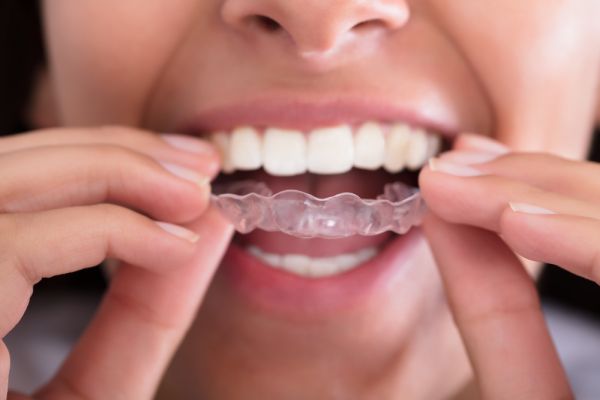When is a Night Guard for Teeth Grinding Recommended?

If you have noticed signs of teeth grinding, it might be time to talk to the dentist about getting a night guard. Patients dealing with the condition may wake up in the morning with sore jaws or a headache. The condition varies in severity and it may be hard to determine the origin of the problem. Either way, a night guard can help protect the teeth from the effects of teeth grinding.
The need for a night guard
Also called a bite guard, this oral device is worn in the mouth and prevents the teeth from rubbing against each other. The dentist will typically recommend a night guard after discovering any of the following signs:
Chipped tooth
A chipped tooth means a visit to the dentist for repairs, but it could also be an indication of a severe case of teeth grinding. As the teeth rub against each other and go back and forth, there is too much pressure on the enamel that may eventually damage the teeth. Tooth damages are often expensive to fix. A weaken enamel also makes the tooth vulnerable to cavities, so it is advisable to get a night guard before additional damages occur.
Chronic teeth grinding
Some people grind their teeth occasionally due to temporary issues like workplace stress. In the case of chronic grinding, it will probably occur as a subconscious activity during sleep. Nighttime teeth grinding require dental attention. Although it will not stop the habit itself, a night guard will reduce the negative impacts on the teeth.
Recurrent headaches
Waking up recurrently with a tension headache or migraine in the morning could be the consequence of nighttime teeth grinding. The dentist may examine the teeth to make the diagnosis. They may recommend a night guard, as well as, relaxation techniques to calm the patient at night and reduce the occurrence of teeth grinding.
TMJ disorder
The temporomandibular joint disorder is often caused by inflammation of the muscles surrounding the jaw joints, which can be traced back to clenching or grinding the teeth against each other. Patients who have been diagnosed with TMJ disorder can talk to their dentist about getting a night guard. It will limit the movement of the jaw joint and reduce bruxism, thus alleviating some of the discomfort or pain from TMJ disorder.
Use of antidepressants
Patients who take antidepressants may be advised to get a night guard by the dentist. According to a study published in 2012 by Clinics, paroxetine, the active ingredient in some antidepressants can contribute to nighttime teeth grinding. The use of certain medications, such as Paxil, may also have this side effect. The medical professional will recommend a nightguard to protect the teeth against the side effects. Patients can also discuss with their doctor about modifying the dosage or changing the drug if teeth grinding becomes burdensome.
Final note
Teeth grinding is a prevalent problem, but with a night guard, individuals do not have to suffer the consequences. Talk to the dentist when noticing any signs of teeth grinding.
Request an appointment here: https://riverfallsfamilydental.com or call River Falls Family Dental at (812) 962-7342 for an appointment in our New Albany office.
Check out what others are saying about our dental services on Yelp: Night Guards in New Albany, IN.
Related Posts
A mouth guard is a valuable tool for protecting oral health. Many individuals may benefit from wearing one. Some people use it to prevent injury while participating in contact sports, while others wear one at night to manage conditions such as teeth grinding and sleep apnea. Understanding when to ask the dentist for a mouth…
Whether playing a contact sport or not, athletes are at risk for dental injuries such as chipped teeth, jaw fractures, and soft tissue damage. A properly fitted mouthguard can mitigate this risk. However, custom and store-bought options offer differences in fit, comfort, and protection. Knowing these differences can help athletes choose the mouthguard that best…
Wearing a mouth guard is important while playing sports. Playing vigorous sports is a common bonding activity among families, friends, and colleagues. Injuries are common in these games, especially when everyone begins to feel competitive. Wearing mouthguards can protect your teeth while playing. If you want to know why putting mouth guards on is important…
A mouthguard is a mouthpiece that protects the teeth and gums. It is frequently used to protect from the harm caused by the habit of teeth grinding. Wearing the device while sleeping can help patients with teeth grinding, also known as bruxism. Continue reading to learn more about mouthguards and their durability.Teeth grinding is a…
